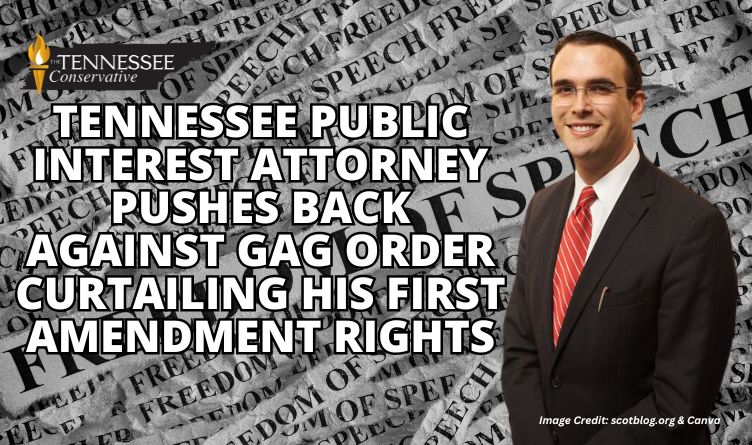Image Credit: scotblog.org & Canva
The Tennessee Conservative [By Paula Gomes] –
A Tennessee public interest attorney is pushing back against a gag order that has curtailed his First Amendment rights.
Nashville civil rights attorney Daniel Horwitz, who recently represented conservative news editor Michael Patrick Leahy in court, is challenging the order against him that has prevented him from speaking out about his own cases for two years.
Partnering with the Institute for Justice (IJ), Horwitz has filed a federal lawsuit because “public-interest litigation requires public discussion.”
Accustomed to suing the government and the contractors they hire over constitutional rights violations, Horwitz has been vocal about his cases in the past, speaking to both reporters and creating posts on social media to bring attention to the infringement of civil rights. A Middle District of Tennessee Local Rule – 83.04 – has restricted Horwitz’s constitutionally protected speech since July 2022.

At the time, Judge Jeffery Frensley – federal magistrate for the U.S. District Court for the Middle District of Tennessee – imposed the gag order against Horwitz, stopping him from making public comments about one of his own wrongful death cases against private prison CoreCivic based in Brentwood, Tennessee.
Horwitz represented the family of Terry Childress who had been incarcerated at CoreCivic’s Trousdale Turner Correctional Center located in Hartsville. Childress died in February 2021 after being assaulted by his cellmate. CoreCivic eventually settled with the family.
In August, the U.S. Department of Justice announced that a civil investigation would soon be launched regarding conditions at the Correctional Center, a prison that has a long reputation for violence, sexual misconduct, and contraband, among other issues.
Aimed at preserving neutrality, a gag order bars an individual from speaking about an ongoing case. However, rules governing gag orders being placed on attorneys exist in only two of Tennessee’s three grand divisions. Only attorneys in the East District and Middle District of Tennessee may be prevented from speaking about a case. Attorneys in the West District are subject to no such orders.
When Horwitz attempted to make clear to the court that he was exercising his First Amendment rights in speaking publicly about the case, CoreCivic argued that he be silenced under the local court’s rule and said that Horwitz’s tweets were “extraordinarily vicious in their verbiage.”
Horwitz’s social media posts contained no private or confidential information. Nevertheless, he was forced to delete any public statements about the prison and told he would be in contempt of the court if he continued to speak to the media about his cases or said anything more online.
“The only purpose of gagging me here, and making me delete statements, is raw censorship,” said Horwitz.

Since the order was imposed, Horwitz has repeatedly challenged the rule limiting his speech but his motions have been ignored by the court who has failed to rule on reinstating his right to free speech. In the meantime, Horwitz has filed seven more lawsuits against the prison. These cases have already been transferred to other districts or settled but Horwitz remains muzzled.
Horwitz says that tweeting about his cases is “a vital part of winning, not only in the courtroom, but with the public” and that seeking media attention raises awareness of “unconstitutional practices.”
Public interest attorneys like Horwitz routinely seek to gain the attention of the media and the public when the government violates constitutional rights. The public awareness in such cases can lead to constituents demanding change from state lawmakers.
“Attorneys, just like everybody else, have a First Amendment right to talk freely about important issues and raise awareness,” said IJ Attorney Ben Field.

About the Author: Paula Gomes is a Tennessee resident and reporter for The Tennessee Conservative. You can reach Paula at paula@tennesseeconservativenews.com.


